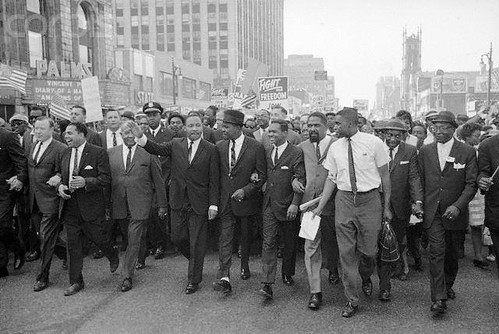
Detroit Walk to Freedom down Woodward avenue on June 23, 1963. Particpants included Dr. Martin Luther King, Jr., Rev. C.L. Franklin, and others. King delivered his first 'I Have a Dream' at Cobo Hall., a photo by Pan-African News Wire File Photos on Flickr.
Aretha Franklin reflects on dad's role in freedom walk
Rochelle Riley, Detroit Free Press 5:36 p.m. EDT June 21, 2013
The famed singer admires her father, the Rev. C.L. Franklin, for sticking to his vision for the 1963 march in Detroit
Rev. C.L. Franklin organized the protest two months before the March on Washington.
Local NAACP, other pastors were against the idea
DETROIT -- The June 1963 Detroit Walk To Freedom almost didn't happen.
That spring, as the Rev. C.L. Franklin worked to convince the city's traditional community and religious leaders to embrace his idea of a massive demonstration to bring national attention to racial discrimination, most of the preachers — and the NAACP — didn't want him to plan or lead it.
"Many pastors whom he invited to our home to discuss it were not on board," his daughter, the singer Aretha Franklin, said in an interview this week. "They didn't think it was such a good idea."
The singer was living in New York that summer, in the third year of her contract with Columbia Records.
"I had never been away from home," she said. "He was monitoring all, and he did come into New York to oversee how things were going."
But despite C.L. Franklin's attention being torn in two directions, he pulled together what would become the largest civil-rights demonstration in U.S. history until the March on Washington two months later.
Detroit's traditional leadership fought him almost to the end.
"They abhorred his public style and denigrated his political status," Nick Salvatore wrote in C.L. Franklin's biography, Singing in a Strange Land: C.L. Franklin, the Black Church and the Transformation of America. "Yet, in this moment of crisis, (Dr. Martin Luther) King had reached out not for Arthur Johnson, his Morehouse College classmate, nor other acquaintances among the black social elite, but for the Mississippi-born migrant."
King's support ended the feud; planning kicked into high gear. And C.L. Franklin knew where to turn to make the march a success.
"It started with Mahalia Jackson, who was a great friend of my dad's," Aretha Franklin said. "Harry Belafonte called Mahalia, and she called my dad.
"He had his vision, and yes it was under his control," the singer said. "It was his vision of what he wanted to be, and of course … it set the stage for the march (on Washington)."
It has become fairly common knowledge that King gave his I Have A Dream Speech in Detroit before offering it to the nation two months later. But in the weeks leading up to the Detroit march, no one knew that, and some worried that the racial tensions that would erupt into massive riots four years later had already begun to boil in the summer of 1963.
"The march was viewed with a lot of fear and apprehension," said the Rev. Nicholas Hood Sr., then pastor of Plymouth United Church of Christ.
On June 23, 1963, when Hood marched his congregation to Woodward and Canfield, it was clear that C.L. Franklin had won.
"None of us had any idea of what we were a part of," Hood said. "We were a part of history, and we didn't know it. ... There's no way I could have imagined how this would have actually turned out."
But Aretha Franklin knew. She believed in her father, and though she couldn't come home for the march, she knew it would be what C.L. Franklin wanted.
"It was absolutely a world statement that certainly went out to all nations that we could not only organize but we were healthy and wealthy in numbers that translated commercially into retail and other things," the singer said.
She contends that crowd estimates for that day have always been wrong.
"You couldn't tell me there were not a million, million and a half people on Woodward that day," she said. "I'm accustomed to appraising numbers of people simply because of my concerts. I'm looking at the miles it covered. You had people everywhere in every corner and on every side and that went on for a very, very long way down Woodward. That was a lot more than 100,000 people."
The Rev. Wendell Anthony, pastor of Fellowship Chapel and president of the Detroit Branch of the National Association for the Advancement of Colored People, is playing the role of C.L. Franklin for this year's 50th anniversary march. But a half-century ago, it was a Mississippi transplant who changed the future.
"In our little local community, C.L. Franklin was the real leader, and he wasn't necessarily accepted by all the black pastors," Hood said. "He was an outstanding gospel preacher, and he wasn't considered in the main line, but they would stand in line at his church to hear him preach."
And 50 years later, as Detroit prepares to rise up and march again, Aretha Franklin reflected on her father and how proud she was that he didn't give up on his vision.
"We look at, and we reflect on his accomplishment, and his achievement in organizing the community in this way," she said. "And I'm very, very happy and pleased and as proud as punch of my dad, having been the single person that organized it all."
No comments:
Post a Comment